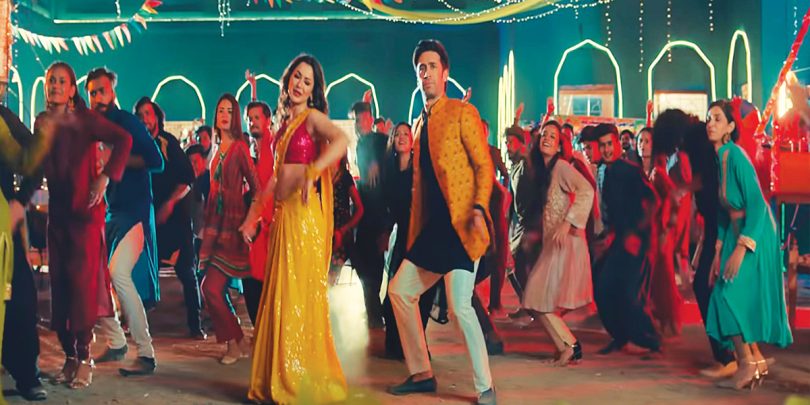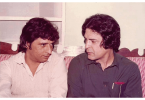“Shani, tumhy bhe apna test karwana parega” (Shani, you have to get your test done) Nazo (Hania Amir) says this to her husband Shani (Ali Rehman) as the trailer of Parde Mein Rehne Do begins. The trailer hinted that the couple is not leading a happy life because of the infertility issue. As a viewer, it was actually shocking as how this is even a dialogue in a Pakistani movie?
To provide better knowledge and a sneak peek into the films, the PR agencies are playing quite a pivotal role in scrubbing the gap between journalists and celebrities, directors and producers. This chance is not only given to the journalists but now the film casts are reaching to the masses to promote their movies and deliver the message across that their films carry. This is also to not let people jump onto conclusions after watching a trailer and before picture releases.
As the cast of PMRD is already busy in promoting their movie, BOLD sat down with Hania Amir, Ali Rehman, Wajahat Rauf and Shazia Wajat to delve deeper into the story and what made them come up with such an extra ordinary narrative that has always been under the rock, especially in Asian societies.
Omair Alavi: There are four films releasing on this eid, what makes your movie special?
Shazia Wajahat: The first reason of the flick being special is Hania herself, and the on-screen chemistry of Hania and Ali. The other factor that adds value to the movie is the topic that we picked. I think this topic needs to be thoroughly discussed. And the third cause could be the movie being completely different from other pictures.
Wajahat Rauf: The unconventional comedy, music, and the cast.
OA: You played Ali’s sister in other movie, and now his wife. Wasn’t this shift a little uncomfortable?
Hania Amir: Not at all. I am an actress and that’s what I have to do (perform). One thing I would like to mention here is that Ali and I have become really good friends now and that is something brings comfort and chemistry when we perform on-screen.
Maheen Aziz: Infertility is a bold topic to even discuss. Were you reluctant picking this character?

HA: I wasn’t reluctant at all. People who know me, know that I don’t shy away from raising my voice about social issues. This was something I accepted wholeheartedly and when I read the script I was very excited and thought that why not such a movie has been made yet. I love my character, the script and everything about this movie.
WR Hania actually memorised the whole script (laughs)
HA: I actually read it five to six times.
OA: How come Ashir Wajahat became the music director of PMRD?
WR: It is an exciting story. We actually had someone else as a music director but thing didn’t work out. Ashir and Hassan Ali usually jam in their studio and they brought this song ‘Peela Rung’ to me and I didn’t take it seriously. However, they fine-tuned it and brought it back, played it with music and it sounded well. After I approved this, they came up with more songs and this is how it was lined up. It was not planned at all.
SW: These are amasing songs. We are happy that Ashir was acting in the movies and now taken over as a music director as well.
MA: After Janan you have been doing dramas only. How does it feel coming back to the big screen?
HA: My acting is not going to be different until the character is different. I think craft remains the same regardless the medium.
WR: Our first and last pick for these roles were Hania and Ali only. I have heard that a few actors were saying that they were offered the role, which is not true.
SW: Hania and Ali were a perfect fit for the film that I came to believe teh saying that whatever happens, happens for good.
OA: Hania is usually crying in dramas and laughing in movies. Why is that so?
HA: I don’t think so. I always believed in playing head strong characters because I do come from a generation who has seen passive and underconfident crying women on TV so I did want a break from this.
OA: Which is the best part of the movie?
HA: The last scene was the best.
MA: There is no entertainment for locals and tickets are expensive. How do you expect a middle class to come and watch a movie?
WR: I completely agree with you. No elite person has ever made a star, stars are made because of the masses. Unfortunately, we do not have a culture of providing entertainment that is the reason authorities don’t pay heed to its seriousness. Even if 10 producers and 10 distributors sit together, there might be some way out of this problem but no one is ready to sit and talk. I have been raising my voice against this. Arts play least role for any government thus they do not regulate or try to structure things when it comes to entertainment. There is only food for entertainment and nothing els which is why there are more restaurants than cinemas.
MA: What do you want to say about those critics who watch the movie for free, grab popcorns for free and then bash your film like anything?
WR: To be very honest, I hated this fact in the beginning. I would wonder why these journalists are writing rubbish when I have seen the general public enjoying the movie, whistling and clapping on jokes in the movie. By the time my second movie came, I got 50% immune and realised that no matter how good my movie is going to be critics will say what they want to say and by the time the third film came I just didn’t care and continued to do so. I now dont read any reviews and spoil my mood.
SW: I would say that critics and bloggers should wait before getting aggressive about a movie. They should wait for at least some time so the general public could go and watch and build an opinion. This is not fair of influencing your opinion on public even before they have watched the movie by calling the movie ‘a flop’ before it actually reached to the audience.
OA: How will you pull the crowd to the cinemas since people have many reasons after COVID to not go to cinema?
WR: I have already done digital deals and my film is not now completely dependent on box office. I have a backup plan as well.
MA: Do you think that scheduling of the movies matter as we often see Paksitani movies releasing somewhere around the Hollywood releases.
WR: There are hardly four to five movies release every year which is not a risk near to me. However, Pakistani movies like Punjab Nahi Jaungi do a lot of business. When Indian movies weren’t ban in Pakistan there was a culture of going to the cinemas but Bollywood flicks would do more business than Lollywood.







